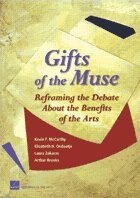 Gifts of the Muse argues that beyond the instrumental benefits of the arts—on individual cognitive development, on attitudes or behaviors that improve school performance, on physical health, on community economic development— people are drawn to the arts for their intrinsic benefits, the sense of meaningfulness, pleasure and satisfaction they provide. The four authors, all associated with the Rand Corporation, make the case that the research which attempts to document instrumental affects is often weak and inclusive. They call for widening the discussion of the value of public support for the arts so that it includes intrinsic value considerations and offer a language and a rationale with which to begin that work.
Gifts of the Muse argues that beyond the instrumental benefits of the arts—on individual cognitive development, on attitudes or behaviors that improve school performance, on physical health, on community economic development— people are drawn to the arts for their intrinsic benefits, the sense of meaningfulness, pleasure and satisfaction they provide. The four authors, all associated with the Rand Corporation, make the case that the research which attempts to document instrumental affects is often weak and inclusive. They call for widening the discussion of the value of public support for the arts so that it includes intrinsic value considerations and offer a language and a rationale with which to begin that work.While there is much in this volume that will be interest to arts organizations seeking public (and private) support, any organization which offers a program that provides intrinsic benefits should take a look. Here's an example.
We did an evaluation some time ago for an organization that teaches chess to children in the public schools. The program wanted to be able to document that chess helped kids concentrate, improved their spatial reasoning skills, and their ability to persist at solving problems. Despite a strong evaluation design, many thousands of dollars later all we could document were very modest effects. Does this mean chess should be eliminated. Of course not. Teaching chess to kids is an intrinsically valuable thing to do. It makes a small, if not entirely measurable, impact on many kids as the study showed. And it will probably make a significant impact on at least a few (say those who go on to play at the tournament level), but that's not the point. Exposure to chess gives kids a chance to try something new, something other than reading, math and, increasingly, test prep. It gives them the chance to try something different, exercise new intellectual muscles, and connect with a pastime that is centuries old.
There are two issues to think about here. The first relates to finding ways to persuade funders that a program's worth isn't always reducible to its instrumental benefits. As we said before, Gifts of the Muse provides a language for doing that. The second relates to figuring out how measure its intrinsic benefits. That's usually not easy and sometimes impossible to do. We'll work on developing some suggested strategies and post them as they percolate up.
No comments:
Post a Comment